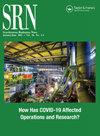非洲研究和技术的同步加速器技术:结构生物学和能源材料的逐步变化
Q3 Physics and Astronomy
引用次数: 3
摘要
2021年6月,科学家们庆祝了来自英国和非洲的研究人员与英国国家同步加速器钻石光源[1]的独特合作所取得的众多成就。同步加速器技术促进非洲研究与技术(START)[2]项目由英国研究与创新科学技术设施委员会(STFC)提供的一项为期3年、价值370万英镑的全球挑战研究基金(GCRF)资助,目的是改善研究人员对Diamond的访问。这笔赠款的职责是资助对非洲可持续发展至关重要的两个研究领域的研究职位:能源材料和结构生物学。其目的是使该项目与联合国关于健康(可持续发展目标3)、能源(可持续发展目标7)、气候(可持续发展目标13)和终身学习(可持续发展目标4)等方面的关键可持续发展目标保持一致。在这篇文章中,我们报道了该计划的亮点以及START的下一步计划。本文章由计算机程序翻译,如有差异,请以英文原文为准。
Synchrotron Techniques for African Research and Technology: A Step-Change in Structural Biology and Energy Materials
In June 2021, scientists celebrated the numerous achievements of a unique collaboration between researchers from the UK and Africa and the UK’s national synchrotron, Diamond Light Source [1]. The Synchrotron Techniques for African Research and Technology (START) [2] programme was funded by a 3-year, £3.7 M Global Challenges Research Fund (GCRF) grant provided by the UK Research and Innovation’s Science and Technology Facilities Council (STFC), with the aim of improving researchers’ access to Diamond. The grant’s remit was to fund research posts focusing on two research areas crucial to African sustainable development: energy materials and structural biology. The aim was to align the project with key United Nations Sustainable Development Goals for health (SDG 3), energy (SDG 7), climate (SDG 13), and life-long learning (SDG 4), amongst others. In this article, we report on highlights of the programme and what’s next on the horizon for START.
求助全文
通过发布文献求助,成功后即可免费获取论文全文。
去求助
来源期刊

Synchrotron Radiation News
Physics and Astronomy-Nuclear and High Energy Physics
CiteScore
1.30
自引率
0.00%
发文量
46
 求助内容:
求助内容: 应助结果提醒方式:
应助结果提醒方式:


